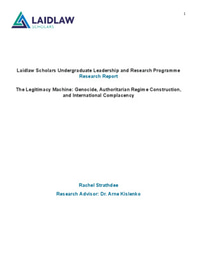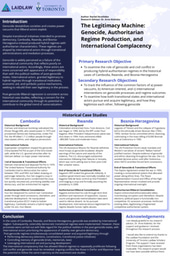Devoting my summer to my research project has been a deeply rewarding and challenging journey, that has facilitated my growth intellectually, methodologically, and personally. When I began, I had a much broader project in mind, and was hoping to identify and analyze determinants of democratic and autocratic regime outcomes in the aftermath of civil conflict. Unsurprisingly, I was quickly overwhelmed by available information, and faced one of the most significant challenges of my project; narrowing the scope of my research while still capturing the complexity of nuanced political landscapes. I initially hoped to examine all aspects of transitional governance and civil society reconstruction, but I had to moderate my urge to explore every facet and detail of historical case studies, as it would be both unfeasible and not at all conducive to producing meaningful findings. Though it was difficult and I was constantly torn between what to eliminate and what to include, I decided to narrow my project to focus on the link between genocide, international intervention, and the emergence of hybrid, illiberal regimes, and did so by selecting a focuses set of case studies. The process of adapting and refining my project really underscored the importance of being flexible throughout my research, as, though I was tempted to hold fast to my original proposal, I had to create a new analytical framework, do away with my preconceptions of what my project would look like and establish realistic goalposts for myself. My project changed and evolved in ways that I could not have predicted, but I found this to be a really valuable experience.
I also found that the research process forced me to develop a high level of discernment for academic sources. My research was entirely academic and archival, and wading through a sea of papers, books, and primary sources like government documents and UN mandates was a difficult task, but it allowed me to develop strong critical evaluation skills and find the valuable aspects of disparate sources to support my thesis. Critically evaluating so many different sources and working across disparate regional and historical contexts was challenging, but I feel much more confident in navigating comparative analysis and interdisciplinary research, even when faced with massive bodies of work.
Perhaps the most valuable aspect of my research experience has been what I’ve personally learned about myself. I worked almost entirely independently, and doing so for long stretches of time forced me to practice self-discipline and time management to a new degree. The scope of my project and the length of the research period felt so overwhelming initially, but practices like setting small goals, creating and sticking to schedules, and holding myself accountable were ultimately very rewarding. I learned how I personally can deal with feeling stuck and overwhelmed, and I feel much more competent in maintaining motivation and tackling challenging research than I did entering the research summer.
Overall, my personal and academic toolkit has grown massively as a result of my Laidlaw experience, for which I am very grateful.



Please sign in
If you are a registered user on Laidlaw Scholars Network, please sign in